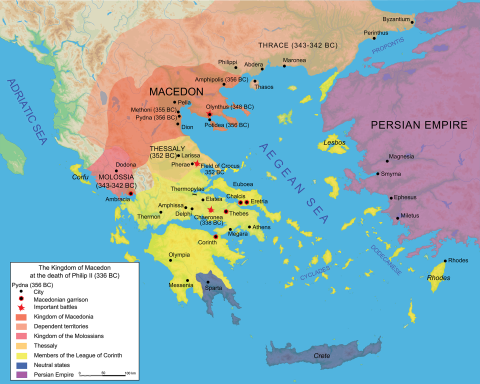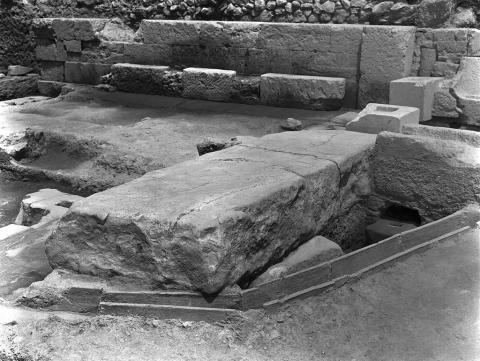[1] πολλά με τὰ παρακαλοῦντα ἦν, ὦ ἄνδρες Ἀθηναῖοι, γράψασθαι Νέαιραν τὴν γραφὴν ταυτηνὶ καὶ εἰσελθεῖν εἰς ὑμᾶς. καὶ γὰρ ἠδικήμεθα ὑπὸ Στεφάνου μεγάλα, καὶ εἰς κινδύνους τοὺς ἐσχάτους κατέστημεν ὑπ᾽ αὐτοῦ, ὅ τε κηδεστὴς καὶ ἐγὼ καὶ ἡ ἀδελφὴ καὶ ἡ γυνὴ ἡ ἐμή, ὥστε οὐχ ὑπάρχων ἀλλὰ τιμωρούμενος ἀγωνιοῦμαι τὸν ἀγῶνα τουτονί· τῆς γὰρ ἔχθρας πρότερος οὗτος ὑπῆρξεν, οὐδὲν ὑφ᾽ ἡμῶν πώποτε οὔτε λόγῳ οὔτε ἔργῳ κακὸν παθών. βούλομαι δ᾽ ὑμῖν προδιηγήσασθαι πρῶτον ἃ πεπόνθαμεν ὑπ᾽ αὐτοῦ, ἵνα μᾶλλόν μοι συγγνώμην ἔχητε ἀμυνομένῳ, καὶ ὡς εἰς τοὺς ἐσχάτους κινδύνους κατέστημεν περί τε τῆς πατρίδος καὶ περὶ ἀτιμίας.
[2] ψηφισαμένου γὰρ τοῦ δήμου τοῦ Ἀθηναίων Ἀθηναῖον εἶναι Πασίωνα καὶ ἐκγόνους τοὺς ἐκείνου διὰ τὰς εὐεργεσίας τὰς εἰς τὴν πόλιν, ὁμογνώμων καὶ ὁ πατὴρ ἐγένετο ὁ ἐμὸς τῇ τοῦ δήμου δωρεᾷ, καὶ ἔδωκεν Ἀπολλοδώρῳ τῷ υἱεῖ τῷ ἐκείνου θυγατέρα μὲν αὑτοῦ, ἀδελφὴν δὲ ἐμήν, ἐξ ἧς Ἀπολλοδώρῳ οἱ παῖδές εἰσιν. ὄντος δὲ χρηστοῦ τοῦ Ἀπολλοδώρου περί τε τὴν ἀδελφὴν τὴν ἐμὴν καὶ περὶ ἡμᾶς ἅπαντας, καὶ ἡγουμένου τῇ ἀληθείᾳ οἰκείους ὄντας κοινωνεῖν πάντων τῶν ὄντων, ἔλαβον καὶ ἐγὼ γυναῖκα Ἀπολλοδώρου μὲν θυγατέρα, ἀδελφιδῆν δ᾽ ἐμαυτοῦ.
[3] προεληλυθότος δὲ χρόνου λαγχάνει βουλεύειν Ἀπολλόδωρος· δοκιμασθεὶς δὲ καὶ ὀμόσας τὸν νόμιμον ὅρκον, συμβάντος τῇ πόλει καιροῦ τοιούτου καὶ πολέμου, ἐν ᾧ ἦν ἢ κρατήσασιν ὑμῖν μεγίστοις τῶν Ἑλλήνων εἶναι καὶ ἀναμφισβητήτως τά τε ὑμέτερα αὐτῶν κεκομίσθαι καὶ καταπεπολεμηκέναι Φίλιππον, ἢ ὑστερίσασι τῇ βοηθείᾳ καὶ προεμένοις τοὺς συμμάχους, δι᾽ ἀπορίαν χρημάτων καταλυθέντος τοῦ στρατοπέδου, τούτους τ᾽ ἀπολέσαι καὶ τοῖς ἄλλοις Ἕλλησιν ἀπίστους εἶναι δοκεῖν, καὶ κινδυνεύειν περὶ τῶν ὑπολοίπων, περί τε Λήμνου καὶ Ἴμβρου καὶ Σκύρου καὶ Χερρονήσου,
notes
vocabulary
1
παρακαλέω παρακαλῶ παρεκάλεσα παρακέκληκα παρακέκλημαι παρεκλήθην: urge, encourage
Ἀθηναῖος –α –ον: Athenian
Νέαιρα: Neaira
εἰσέρχομαι εἰσελεύσομαι εἰσῆλθον εἰσελήλυθα––––––: to come into court
Στέφανος: Stephanos
ἔσχατος –η –ον: furthest, uttermost, last
κηδεστής ὁ: son-in-law; father-in-law; brother-in-law
ἀδελφή –ῆς ἡ: sister
τιμωρέω τιμωρήσω ἐτιμωρησάμην τετιμώρηκα τετιμώρημαι ἐτιμωρήθην: help, avenge
ἀγωνίζομαι , ἀγωνιοῦμαι, ἠγωνισάμην ––– ἠγώνισμαι ἠγωνίσθην: to contend in court
ἔχθρα –ας ἡ: hatred, enmity
πώποτε: ever yet
προδιηγέομαι: to relate beforehand, premise
συγγνώμη –ης ἡ: forbearance, allowance, pardon
ἀμύνω ἀμυνῶ ἤμυνα ἤμυκα ἤμυμαι ἠμύνηθην: defend
ἀτιμία: dishonor; disenfranchisement
2
ψηφίζω ψηφιοῦμαι ἐψήφισα ἐψήφικα ἐψήφισμαι ἐψήφισθην: vote
Πασίων: Pasion
ἔκγονος –ον: born of, sprung from
εὐεργεσίαἡ: good deed, kindliness
ὁμογνώμων: of one's mind, like-minded
δωρεά –άς ἡ: a gift, present
Ἀπολλόδωρος: Apollodoros
χρηστός –ή –όν: useful, good, honest
οἰκεῖος –α –ον: domestic, of the house; related
κοινωνέω: have a share, take part in
ἀδελφιδῆ: a brother’s or sister’s daughter, a niece
ἐμαυτοῦ –ῆς: (of) myself
3
προέρχομαι προεῖμι προῆλθον προελήλυθα––––––: go forward, go on, advance
λαγχάνω λήξομαι ἔλαχον εἴληχα––––––: obtain by lot, have as portion; obtain an office by lot
δοκιμάζω: to examine for office-holding
ὄμνυμι(or ὀμνύω) ὀμοῦμαι ὤμοσα ὀμώμοκα ὀμώμο(σ)μαι ὠμόθην: to swear an oath
νόμιμος –η –ον: customary, lawful
ὅρκος –ου ὁ: oath
Ἕλλην –ος ὁ: Greek man
ἀναμφισβήτητος: undisputed, indisputable
καταπολεμέω: to war down, defeat utterly
Φίλιππος ὁ: Philip II of Macedon
ὑστερίζω: to come after, come too late
βοήθεια –ας ἡ: help, aid
προίημι προήσω προῆκα προεῖκα προεῖμαι προείθην: (in mid.) to desert, give up
σύμμαχος –ου ὁ: fighting together, allied; favorable
ἀπορία –ας ἡ: difficulty, perplexity
καταλύω καταλύσω κατέλυσα καταλέλυκα καταλέλυμαι κατελύθην: dissolve, destroy
στρατόπεδον –ου τό: camp, army
ἄπιστος –ον: not to be trusted
κινδυνεύω κινδυνεύσω ἐκινδύνευσα κεκινδύνευκα κεκινδύνευμαι ἐκινδυνεύθην: risk
ὑπόλοιπος –ον: left behind, staying behind
Λῆμνος –ου ἡ: Lemnos
Ἴμβρος –ου ἡ: Imbros
Σκῦρος –ου ἡ: Skyros, an island northwest of Chios, with a city of the same name, or, a town in Lesser Phrygia
Χερσόνησος ἡ: the (Thracian) Chersonese


